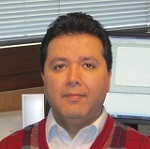Invited Speakers
Title: Hyper-heuristics: past, present, and future
Speaker:
 |
Ender Özcan, University of Nottingham, UK |
Abstract: There is a growing interest in developing more general problem solving techniques that can be applied to different problem domains rather than manually having to customise solutions for each specific domain and instance even in some cases. Hyper-heuristics have emerged as such reusable methods automating the design and/or control of (meta-)heuristics. This talk will provide an overview of hyper-heuristics starting from the early sixties when the initial ideas arose.
Biography: Dr Ender Özcan is a lecturer in Operational Research and Computer Science with the Automated Scheduling, Optimisation and Planning (ASAP) research group in the School of Computer Science at the University of Nottingham, UK. He received his PhD from the Department of Computer and Information Science at Syracuse University, NY, USA in 1998. He worked as a lecturer in the Department of Computer Engineering at Yeditepe University, Istanbul, Turkey from 1998-2007. He established and led the ARTIficial Intelligence research group from 2002. He served as the Deputy Head of the Department from 2004-2007. Dr Özcan was appointed as a senior research fellow in 2008 to the EPSRC funded LANCS initiative, which was one of the largest Science and Innovation Rewards given by EPSRC (Engineering and Physical Sciences Research Council, UK). He became a lecturer in 2009. He served as an executive committee member for the LANCS initiative. He was on the advisory board of the first Cross-domain Heuristic Search Challenge (CHeSC 2011) and co-organised the second challenge (CHeSC 2014). He chaired the PATAT 2014 conference. Dr ÷zcan has over 100 refereed publications at reputable venues. His research interests and activities lie at the interface of Computer Science, Artificial Intelligence and Operational Research,with a focus on intelligent decision support systems combining data science techniques and (hyper/meta)heuristics applied to real world problems. He has been awarded grants as principal investigator and co-investigator/named researchers from The Scientific and Technological Research Council of Turkey, T.R. Prime Ministry State Planning Organisation and CONACyT. Dr Özcan is the Deputy Director of the EPSRC's National Taught Course Centre in Operational Research (NATCOR). He is Steering Committee member and Executive Officer of the International Conference Series on the Practice and Theory of Automated Timetabling (PATAT). He is Associate Editor of the Journal of Scheduling and International Journal of Applied Metaheuristic Computing.
Title: Deep Sub-Cultured Problem Solving in Cultural Algorithms
Speaker:
| Robert G. Reynolds, Wayne State University, USA |
Abstract: Deep learning in Neural Networks is said to take place when more than one hidden layer of neurons is used. Cultural Algorithms are knowledge-driven swarm-based models of cultural evolution in which agents are connected through a basic social fabric or network. Deep sub-cultured learning takes place in cultural algorithms when problem-solving knowledge is filtered through additional sub-cultures or networks that extract certain features, similar to what the hidden layers do in Neural Networks. These sub-cultures can emerge during the problem solving process so it is important to manage the efficiency and effectiveness of an evolving cultural system.
In this talk a model, the Cultural Engine, based upon principles of social thermos-dynamics is used to monitor Cultural Algorithm performance over time in terms of selected social metrics. Examples of run time metric trajectories are presented over a range of problems. We show that as the number of independent processes (layers) that are involved in the production of a problem landscape increases, the more advantageous deep learning with subcultures is in the directing the population to a solution. Some examples of real-world applications will be discussed.
Biography: Dr. Robert G. Reynolds received his Ph.D. degree in Computer Science, specializing in Artificial Intelligence from the University of Michigan, Ann Arbor. He is currently a professor of Computer Science and director of the Artificial Intelligence Laboratory at Wayne State University. He is also an Adjunct Associate Research Scientist with the Museum of Anthropology at the University of Michigan-Ann Arbor, and a member of the Complex Systems Group at the University of Michigan-Ann Arbor. His interests are in the development of computational models of cultural evolution for use in the simulation of complex organizations and in computer gaming applications.
Dr. Reynolds has received funding from both government and industry to support his work. He has co-authored three books and over 250 papers on the evolution of social intelligence in journals, book chapters, and conference proceedings. The journals include IEEE Computer, IEEE Computational Intelligence, Complexity, Scientific American, IEEE Transactions of Evolutionary Computation, IEEE Transactions on Systems, Man, and Cybernetics, IEEE Software, Communications of the ACM, and the Proceedings of the National Academy of Sciences.





